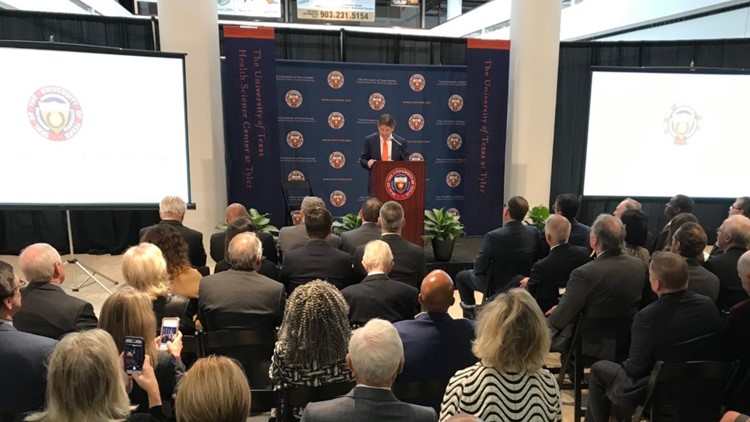TYLER, Texas — The University of Texas System today announced its intention to establish a medical school in Tyler – the first in East Texas – to increase access to health care in the region.
Leaders from the UT System and the two UT institutions in Tyler joined together at Plaza Tower in downtown Tyler to announce a plan to elevate the region’s higher education and health care opportunities. They optimistically explained their case to a group of regional business, civic, educational and medical leaders and elected officials at a morning news conference.
A proposal to establish a medical school in Tyler will be on the agenda at the UT System Board of Regents’ next meeting, Feb. 26 in Austin. The regents’ authorization will allow notifications and other activities to proceed with the Texas Higher Education Coordinating Board and other licensing and accrediting agencies.
Board of Regents Chairman Kevin P. Eltife, Chancellor James B. Milliken, UT Health Science Center at Tyler President Kirk A. Calhoun and UT Tyler President Michael V. Tidwell emphasized that it’s time to address this need in a region growing in population that historically has had a shortage of health care professionals compared to other regions in the state.
Under the new plan, with established medical residencies already in place, future physicians could complete their entire education and training in Tyler, ultimately providing more top health care professions who will live and serve in the region.
“A medical school in Tyler will give East Texans the chance to pursue their career aspirations without having to leave the region to do so,” said Eltife, a former Tyler mayor and state senator. “More importantly, it will increase the number of physicians and critical specialty areas to serve the region, which ultimately will enhance health outcomes and benefit all East Texans. And having more health care professionals in the area will have a positive impact on hospitals and hospital systems in the region including UT Health East Texas, CHRISTUS Trinity Mother Frances and Baylor Scott & White Texas Spine & Joint.”
If approved, the medical school would be the seventh in the UT System. Most recently, both UT Austin and UT Rio Grande Valley opened medical schools in 2016.
“Health outcomes in East Texas lag the rest of the state and the nation, and today’s announcement represents an ambitious strategy to change that going forward. With six medical schools—and our two Tyler institutions, the University of Texas System is uniquely positioned to develop a new school in Tyler, specifically focused on the needs of the region,” Chancellor Milliken said. “The strength of UT Health Science Center at Tyler and UT Tyler, particularly as they join forces, and our experience operating very successful medical schools across Texas, will provide a solid foundation for success.”
The economic impact of a medical school is projected to be significant. The Perryman Group, a Texas economic research and analysis firm with ties to the region for more than 40 years, credited existing UT facilities in Tyler with providing an annual economic impact of $1.7 billion, including $80.1 million in tax receipts and the creation of 21,529 jobs.
“According to The Perryman Group’s analysis, we can anticipate that a new medical school would produce an additional $1.9 billion annually, as well as the creation of 18,145 new jobs. These developments are unlike anything Tyler has ever seen,” said Tom Mullins, president and CEO of the Tyler Economic Development Council.
“A medical school in Tyler will have a cascade of positive multiplier effects,” said Calhoun, the president of UT Health Science Center Tyler. “There’s a growing awareness about both the challenges and the potential of East Texas, and it’s exciting to see momentum build to support and invest in our region.”
““We are profoundly grateful to the UT System for its investment in the future healthcare in East Texas,” said Michael Tidwell, UT Tyler President. “These programmatic and facilities investments will improve healthcare education, research, and clinical services for generations to come.”
Today’s news was preceded by two major announcements recently made by the UT System Board of Regents. In November the Board of Regents allocated $95 million in Permanent University Fund proceeds for UT Tyler and UT Health Science Center Tyler to construct two facilities to accelerate high-quality health education and health care in East Texas. Regents earmarked $60 million for a graduate medical education and resident teaching facility at UT Health Science Center and $35 million for an advanced nursing and health sciences complex at UT Tyler.
And in December, Regents authorized the integration of talent and assets at UT Tyler and UT Health Science Center at Tyler to create a unified institution to enhance education, research and clinical delivery for the region.
RELATED: WATCH LIVE: UT System to make 'major announcement' regarding new health initiative in East Texas
RELATED: Gene editing research at UT Health Science Center at Tyler could yield effective new treatments
RELATED: 2020: UT Tyler to add mental health program as Texas ranks last in access to mental health care
For more than 130 years, The University of Texas System has been committed to improving the lives of Texans and people all over the world through education, research and health care. With 14 institutions, an enrollment of nearly 240,000 students and an operating budget of $21.1 billion (FY 2020), the UT System is one of the largest public university systems in the United States. UT institutions produce more than 60,000 graduates annually and award more than one-third of the state’s undergraduate degrees and more than half of its health professional degrees. Collectively, UT-owned and affiliated hospitals and clinics accounted for more than 8.2 million outpatient visits and 1.6 million hospital days last year. Across UT institutions, research and development expenditures total $2.9 billion – the second highest among U.S. public higher education systems – and the UT System is regularly ranked among the top 10 most innovative universities in the world. The UT System also is one of the largest employers in Texas, with more than 21,000 faculty – including Nobel laureates and members of the National Academies – and more than 83,000 health care professionals, researchers and support staff.
Under the leadership of Dr. Kirk A. Calhoun, president, The University of Texas Health Science Center at Tyler provides graduate students, medical residents and other medical professionals in training with the unique opportunity to learn alongside scientists, physicians and other healthcare experts. UT Health Science Center at Tyler offers graduate degrees in biotechnology, public health and health administration, training tomorrow’s leaders in these fields of advanced study, providing them with marketable skills and the qualifications to excel in today’s workforce. The University of Texas Health Science Center at Tyler is a proud component of UT Health East Texas, which comprises UT Health Science Center and a 10-hospital health system throughout East Texas.
A member of the prestigious UT System, The University of Texas at Tyler focuses on student success and innovative research in the more than 80 undergraduate and graduate degree programs offered. With more than 10,000 students, UT Tyler has facilities in Tyler, Longview, Palestine and Houston
The Tyler Economic Development Council (TEDC) is a non-profit organization that promotes the creation and retention of primary jobs for Tyler and the diversification of the economic base to expand employment opportunities in the region.
Benefiting from a strong labor force and excellent local infrastructure, TEDC has assisted in the creation or retention of over 22,000 jobs since its inception in 1989 and generated over $843 million in new investment in the Tyler area during that time. Tyler has one of the lowest city property tax rates in the state, a municipal government with no tax supported debt, is close to Interstate 20, and is served by a regional airport with multiple daily connections to two major international hubs - Dallas Fort Worth International Airport, and Houston Intercontinental. All of these factors make Tyler an easy place to do business.



